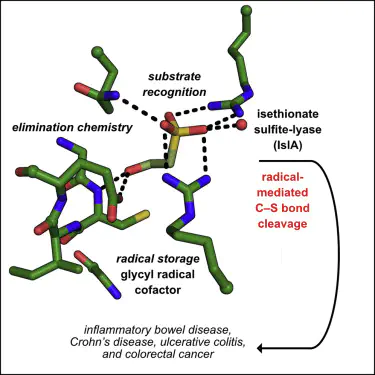Molecular basis of C-S bond cleavage in the glycyl radical enzyme isethionate sulfite-lyase

Abstract
Desulfonation of isethionate by the bacterial glycyl radical enzyme (GRE) isethionate sulfite-lyase (IslA) generates sulfite, a substrate for respiration that in turn produces the disease-associated metabolite hydrogen sulfide. Here, we present a 2.7 Å resolution X-ray structure of wild-type IslA from Bilophila wadsworthia with isethionate bound. In comparison with other GREs, alternate positioning of the active site β strands allows for distinct residue positions to contribute to substrate binding. These structural differences, combined with sequence variations, create a highly tailored active site for the binding of the negatively charged isethionate substrate. Through the kinetic analysis of 14 IslA variants and computational analyses, we probe the mechanism by which radical chemistry is used for C-S bond cleavage. This work further elucidates the structural basis of chemistry within the GRE superfamily and will inform structure-based inhibitor design of IsIA and thus of microbial hydrogen sulfide production.